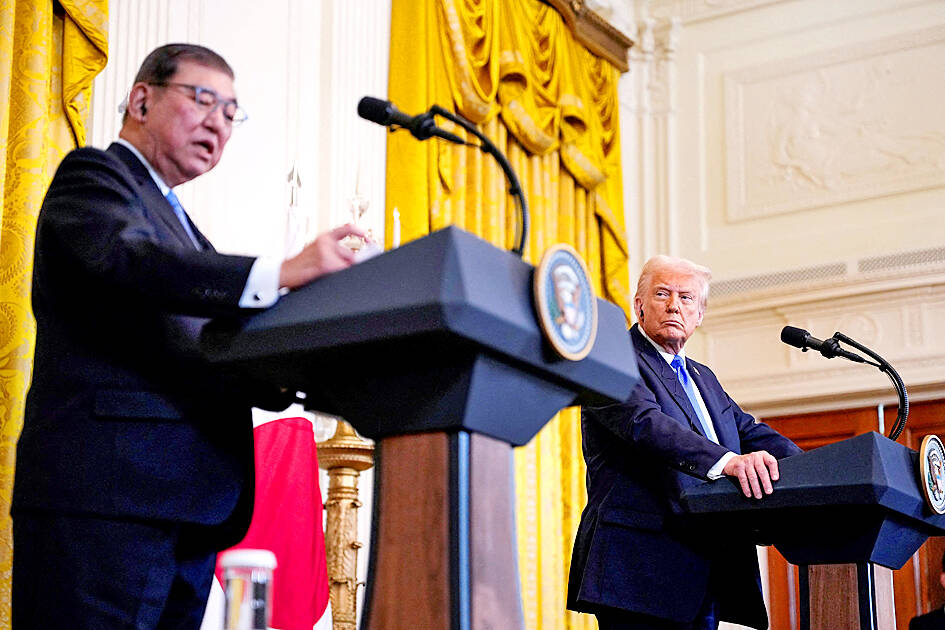Japanese Prime Minister Shigeru Ishiba yesterday expressed optimism that his country could avoid higher US tariffs, saying US President Donald Trump had “recognized” Japan’s huge investment in the US and the American jobs that it creates.
At his first White House summit on Friday, Ishiba told public broadcaster NHK that he explained to Trump how many Japanese automakers were creating jobs in the US.
The two did not specifically discuss auto tariffs, Ishiba said, adding that he did not know whether Japan would be subject to the reciprocal tariffs that Trump has said he plans to impose on imports.

Photo: Reuters
Tokyo has so far escaped the trade war Trump unleashed in his first weeks in office. He has announced tariffs on goods from Canada, Mexico and China, although he postponed the 25 percent duties on his North American neighbors to allow for talks.
The escalating trade tensions since Trump returned to the White House on Jan. 20 threaten to rupture the global economy.
Ishiba said he believes Trump “recognized the fact Japan has been the world’s largest investor in the United States for five straight years and is therefore different from other countries.”
“Japan is creating many US jobs. I believe [Washington] won’t go straight to the idea of higher tariffs,” he said.
Ishiba voiced optimism that Japan and the US can avoid a tit-for-tat tariff war, stressing that tariffs should be put in place in a way that “benefits both sides.”
“Any action that exploits or excludes the other side won’t last,” Ishiba said.
“The question is whether there is any problem between Japan and the United States that warrants imposing higher tariffs,” he added.
Japan had the highest foreign direct investment in the US in 2023 at US$783.3 billion, followed by Canada and Germany, the most recent US Department of Commerce data showed.
Trump pressed Ishiba to close Japan’s US$68.5 billion annual trade surplus with Washington, but expressed optimism this could be done quickly, given a promise by Ishiba to bring Japanese investment in the US to US$1 trillion.
Ishiba yesterday identified liquefied natural gas, steel, artificial intelligence and cars as areas that Japanese companies could invest in.
He also touched on Trump’s promise to look at Nippon Steel Corp investing in US Steel Corp, as opposed to buying the storied US company — a planned purchase opposed by Trump and blocked by former US president Joe Biden.
“Investment is being made to ensure that it remains an American company. It will continue to operate under American management, with American employees,” Ishiba said. “The key point is how to ensure it remains an American company. From President Trump’s perspective, this is of utmost importance.”
On military spending, another area where Trump has pressed allies for increases, Ishiba said Japan would not increase its defense budget without first winning public backing.
“It is crucial to ensure that what is deemed necessary is something the taxpayers can understand and support,” he said.

Hon Hai Precision Industry Co (鴻海精密) yesterday said that its research institute has launched its first advanced artificial intelligence (AI) large language model (LLM) using traditional Chinese, with technology assistance from Nvidia Corp. Hon Hai, also known as Foxconn Technology Group (富士康科技集團), said the LLM, FoxBrain, is expected to improve its data analysis capabilities for smart manufacturing, and electric vehicle and smart city development. An LLM is a type of AI trained on vast amounts of text data and uses deep learning techniques, particularly neural networks, to process and generate language. They are essential for building and improving AI-powered servers. Nvidia provided assistance

DOMESTIC SUPPLY: The probe comes as Donald Trump has called for the repeal of the US$52.7 billion CHIPS and Science Act, which the US Congress passed in 2022 The Office of the US Trade Representative is to hold a hearing tomorrow into older Chinese-made “legacy” semiconductors that could heap more US tariffs on chips from China that power everyday goods from cars to washing machines to telecoms equipment. The probe, which began during former US president Joe Biden’s tenure in December last year, aims to protect US and other semiconductor producers from China’s massive state-driven buildup of domestic chip supply. A 50 percent US tariff on Chinese semiconductors began on Jan. 1. Legacy chips use older manufacturing processes introduced more than a decade ago and are often far simpler than

STILL HOPEFUL: Delayed payment of NT$5.35 billion from an Indian server client sent its earnings plunging last year, but the firm expects a gradual pickup ahead Asustek Computer Inc (華碩), the world’s No. 5 PC vendor, yesterday reported an 87 percent slump in net profit for last year, dragged by a massive overdue payment from an Indian cloud service provider. The Indian customer has delayed payment totaling NT$5.35 billion (US$162.7 million), Asustek chief financial officer Nick Wu (吳長榮) told an online earnings conference. Asustek shipped servers to India between April and June last year. The customer told Asustek that it is launching multiple fundraising projects and expected to repay the debt in the short term, Wu said. The Indian customer accounted for less than 10 percent to Asustek’s

Gasoline and diesel prices this week are to decrease NT$0.5 and NT$1 per liter respectively as international crude prices continued to fall last week, CPC Corp, Taiwan (CPC, 台灣中油) and Formosa Petrochemical Corp (台塑石化) said yesterday. Effective today, gasoline prices at CPC and Formosa stations are to decrease to NT$29.2, NT$30.7 and NT$32.7 per liter for 92, 95 and 98-octane unleaded gasoline respectively, while premium diesel is to cost NT$27.9 per liter at CPC stations and NT$27.7 at Formosa pumps, the companies said in separate statements. Global crude oil prices dropped last week after the eight OPEC+ members said they would